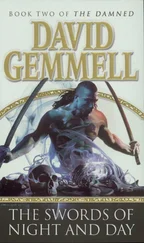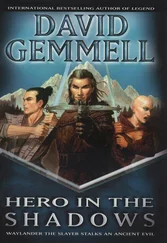'First put some blue in your hair,' said Rael, with a weary smile. 'Then take a few days' rest. After that gather your crew. None of them has ever fought on a fully charged Serpent. Take them out to sea. Train them. I shall also give you thirty Avatar soldiers.'
'All the ship's weapons need to be recharged,' said Talaban. That will require more than a hundred crystals.'
'I will send them to the ship.'
'You think the newcomers will seek a war?'
'It is inevitable.' Rael gave a weary smile. 'For they will be arrogant, just like us, and believe in their superiority and divine right to rule.'
The tavern was deserted, the diners departed, the tables empty. Yet still Sofarita did not sleep. She sat on the windowsill, tense and fearful, gazing down at the silent square. She could not relax for if she did, images would flow past her mind's eye, people she did not know, places she had not seen, words and conversations she had never heard.
Each time the visions came she felt as if she were flowing with them, drowning in a sea of lives. She feared the flow. Once, as a small child, she had fallen into the Luan, tumbling down the mud bank to disappear beneath the fast-flowing water. A farmer had plunged in to rescue her, dragging her clear. But there was no farmer now to pull her back from this river of other people's dreams.
Sofarita could not understand why this mystical phenomenon should be happening to her. She had never before experienced visions. She wondered if it could be a sign of approaching madness. Perhaps the visions were not real, but just her imaginings. Perhaps she had a fever. She lifted a hand to her brow. It was not hot. Rising from the sill she walked back into the room and drank a cup of water. Weariness dogged her, and she longed for the bliss of sleep.
But what if she never woke? What if the river of dreams carried her away?
She knew no-one in the city to whom she could turn for help. You are alone, she told herself. You must help yourself. This thought was curiously helpful. True, she could rely on no-one and yet, conversely, no-one relied upon her. She was truly free for the first time in her life. Not subject to the whims of a father who believed women were of little worth, nor of a husband she had liked and respected — but never truly loved. No longer chained within a close-minded village society.
The river of dreams at least offered excitement.
Sofarita lay down upon the bed, her head upon the pillow. Drawing the blankets over her shoulders she closed her eyes. There were no visions, no haunting scenes.
She was in the cellar of the tavern. Baj was sitting at a narrow table, his head in his hands. He was weeping.
A man was sitting close by. He was middle-aged, with silver-streaked yellow hair and beard. There was a golden-haired child asleep on a cot bed by the wall. Sofarita watched the scene, dispassionately at first, but then Eaj's distress touched her. She moved forward to comfort him — and realized she was floating above the scene.
The men could not see her.
'Stop your crying, man, and tell me what happened,' said the older man.
'He killed them. It was horrible.' Baj looked up, his face a mask of anguish. 'I did nothing, Boru. I stood frozen in the shadows.'
'He would have killed you too,' said Boru. 'To attack Viruk was stupidity beyond belief.'
'Forjal saw him walking to the meeting. He was unarmed. If I had acted
'But you did not,' said Boru harshly. 'Did Forjal talk before he died?'
'Yes, but he only told Viruk that someone would kill him. He refused to say who sent him. But what if they find the bodies? Forjal worked for me. I could be implicated.'
'Stop your whining, man! They will find the bodies, but not the heads. They are in a weighted sack, which I hurled from the dock. But understand this, Baj, there must be no further acts of individual violence. Everything must be planned. You and Forjal risked everything by one act of indescribable stupidity. Now he and the other fool are dead. And, were it left to me, I would cut your throat now. But you are to be given another chance. From now on you will follow orders. You will take no precipitate action. Do you understand this?'
Baj nodded. 'I am sorry.'
'Apologize to the spirits of Forjal and his friend.'
Sofarita opened her eyes. The bedroom was dark, lit only by a shaft of moonlight coming through the small window. She felt incredibly rested, though she could not have been asleep for more than an hour. She had blown out the lanterns before climbing into bed, and she had no means now of lighting them.
Even as the thought occurred to her, one of the lanterns flickered into life and a gentle glow filled the room.
Sofarita sat up. Looking across at the second lantern she pictured it alight.
The wick flamed instantly. Sofarita leaned back on the pillow. There was no panic now.
For this had to be a dream. Settling down and pulling the blankets around her she slept again.
The home of Methras was on the eastern outskirts of the city, close to the lumber yards, and closer still to a slaughterhouse, built two years ago on the old meadow. A hundred years ago the area had been highly popular with well-to-do Vagars, men who were not yet rich but who were climbing through the ranks of the merchant classes. Now it was run-down and shabby, though some of the older homes were well built, and occasionally fronted with marble.
Methras had walked the four miles from the wharf and, as he opened the small gate that led to the rear garden, he saw two horses tethered in the shade behind the house. He was tired and in no mood for company as he strolled along the garden path. A figure in a dress of sky-blue satin stepped into the garden. She saw him and ran to meet him. In her late forties, his mother was still a handsome woman, though her once-trim figure had thickened a little and there was now grey in her golden hair. She kissed his cheek. 'Welcome home, my son,' she said, taking his arm and leading him inside.
'Who is here?' he asked her.
'An old friend of yours, come to greet you upon your return,' she told him. 'And his uncle from beyond the Luan.'
Pausing in the kitchen he poured a long, cool drink of water from a pottery jug and drained it. Then he turned to his mother and smiled. 'It is good to see you. You are looking well. Is that a new dress?' With a wide smile she stepped back from him, and twirled. The heavy satin of the dress lifted briefly as she spun.
'Do you like it?'
'It is very becoming. Does this mean you are in love again?'
'Don't be sarcastic,' she scolded him gently. 'You think I am too old for love?'
'You don't look a day over twenty-five,' he assured her. 'Who is this lucky man?'
'He is a merchant, recently arrived from Pagaru. He is a fine man. Very witty and entertaining.'
'How old?'
'Fifty — or so he says. I think he's closer to sixty. But he's a fine figure of a man.'
'He would have to be,' said Methras. 'Now tell me who is here?'
'Don't you want to be surprised?'
'I don't like surprises.'
'You used to,' she said. 'I remember when you were very young…"
'Not now, mother,' he said, gently. 'Who is here?'
'It is Pendar.' She leaned in close. 'And he is rich now,' she whispered. 'You should have accepted his offer and joined him in partnership. Perhaps he still wants you.'
'I am sure that he does,' said Methras with a wide smile.
His mother reddened. 'Oh you know I didn't mean that,' she said. 'I know Pendar — ' she struggled for words — 'prefers the company of young men. But I know he values your judgement.'
Читать дальше












